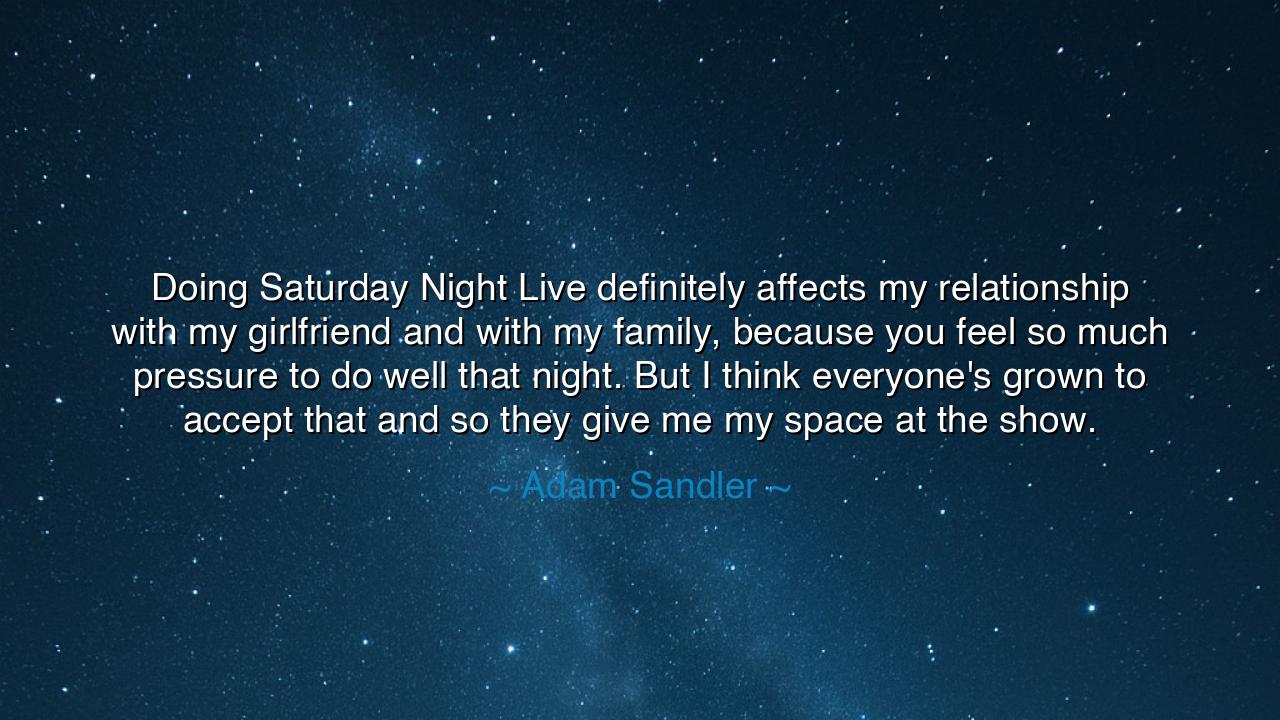
Doing Saturday Night Live definitely affects my relationship with
Doing Saturday Night Live definitely affects my relationship with my girlfriend and with my family, because you feel so much pressure to do well that night. But I think everyone's grown to accept that and so they give me my space at the show.






Adam Sandler, comedian of warmth and bearer of laughter, once confessed with honesty: “Doing Saturday Night Live definitely affects my relationship with my girlfriend and with my family, because you feel so much pressure to do well that night. But I think everyone's grown to accept that and so they give me my space at the show.” At first these words may sound simple, the musings of a performer balancing work and life. Yet within them lies a timeless truth: that the pursuit of one’s calling often demands sacrifice, and that those who love us must give us the space to grow, even when the weight of expectation presses heavily upon our shoulders.
The meaning of this saying is woven from the tension between duty and devotion. To perform on Saturday Night Live, or in any arena where the eyes of the world are fixed upon you, is to carry a burden of immense pressure. Every moment is judged, every failure magnified, every triumph fleeting. In such a crucible, the performer cannot always be the partner, the child, the friend that loved ones may long for. And yet, Sandler shows gratitude in saying that those around him have learned to accept this, offering him the precious gift of space, so that he may meet the demands of his art.
The origin of this wisdom is not unique to comedy, nor even to the stage. It flows from the eternal struggle of all who walk the path of excellence. The sculptor lost in the chisel, the soldier preparing for battle, the scientist sleepless in the lab—all know the strain of carrying a calling so great that it bends the bonds of daily life. Sandler speaks for them all, reminding us that no man or woman rises to greatness without first passing through seasons where those closest must endure absence, distraction, or silence.
History gives us many such examples. Think of Michelangelo, summoned to paint the Sistine Chapel. For years he lay upon his back in torment, covered in plaster dust, consumed by divine labor. His friends and family scarcely saw him, for his soul was married to the ceiling above him. Yet when the work was done, the world was transformed. Or consider Abraham Lincoln, who, burdened with the pressure of holding a nation together, often seemed distant even to those he loved most. His space was demanded by destiny itself, and those around him had to understand that his devotion to his calling was, in truth, a devotion to them all.
But Sandler’s words carry also a gentleness. He does not rejoice in neglect, nor does he dismiss the strain placed upon his relationships. Instead, he speaks of gratitude—that those who love him do not resent his absence, but accept it, recognizing that his labor is part of who he is. This is a lesson in the power of understanding, for the bonds of love must stretch if they are to endure. Without patience, without the gift of space, they would break. With it, they grow stronger, becoming not chains but bridges between calling and companionship.
O children of tomorrow, take this wisdom to heart: when you or your loved ones walk the path of great endeavor, know that pressure will come, and with it distance. Do not despise this distance, but honor it. Give your companions the space they need, and trust that in time they will return, carrying the fruit of their labors. And if you are the one called to the stage, the battlefield, or the workshop, remember to give thanks to those who wait, who understand, who sacrifice unseen so that you may rise.
Therefore, the lesson is clear: greatness is never achieved alone. Behind every artist, every leader, every dreamer, stand the silent pillars of family and friends who endure the absence and grant the freedom of space. Honor them. Do not forget them. For when the show ends, when the burden of pressure is lifted, it is to them you will return, and it is their love that will remind you why the struggle was worth it.
Thus Adam Sandler’s words endure as more than the reflections of a comedian. They are a teaching for all who seek to balance passion and love, labor and life. They remind us that the path to greatness is shared—not only by the one who walks it, but by all who, in patience and sacrifice, walk beside him unseen.






AAdministratorAdministrator
Welcome, honored guests. Please leave a comment, we will respond soon